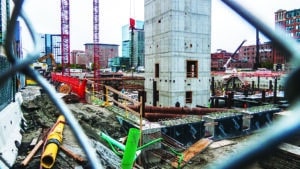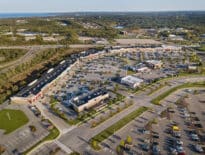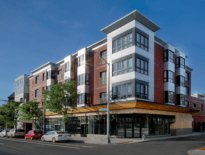Boston Mayor Marty Walsh says the city’s construction boom is bearing fruit in the form of slower rent increases.
Citing data the city gathered from apartments listings on MLS PIN and Rental Beast, the mayor’s office announced Boston had seen the slowest increase in monthly listing rents since it began tracking the information in 2014. According to the city’s analysis, from 2018 to 2019, rental prices increased an average of 1.3 percent citywide compared to a 3.3 percent increase from 2017 to 2018.
“The stabilization of rents across our neighborhoods demonstrates our housing plan in action,” Walsh said in a statement. “We know housing is the cornerstone of creating more opportunities for all, and we will continue our work producing and preserving housing for our residents. While I know we have more work to do to keep pace with the demand for affordable housing, I am encouraged by this milestone, and look forward to keeping up this momentum.”
According to the city’s analysis, rents in several neighborhoods, on average, saw no price increase or a reduction in prices across the span of listings, including studios, and one- to three-bedroom listings, including Back Bay, Beacon Hill, Roslindale and South Boston. Of the City’s housing stock, listings for studio rents in Dorchester, East Boston, Charlestown and Jamaica Plain showed a decrease from 2018 to 2019. One-bedroom rents in Back Bay, Beacon Hill, Charlestown and South Boston all saw decreases. Roxbury saw no change in listing rent prices from 2018-2019 for studios, two- or three-bedroom units. Mattapan, the Fenway, and South Boston all saw no increases in two- and three-bedroom units.
“Despite slowing demand and the continued strength of new construction, U.S. rental markets remain extremely tight, with rents rising faster than inflation in most markets across the country,” Chris Herbert, managing director of the Harvard University Joint Center for Housing Studies, said in a statement. “But Boston appears to be bucking the national trend with slowing increases in rents that seems clearly linked to the substantial increase in the City’s supply of new apartments in recent years.”
The city has now permitted 30,442 units since 2011, 6,004 of them affordable units, chiefly concentrated downtown and in South Boston, with substantial chunks also permitted in the South End, Allston/Brighton and East Boston. Apartments make up 3 out of every 4 permitted units. Of the ownership units, a little more than half were one bedroom or smaller, and the other half being two-bedroom units or larger. When completed, the 30,442 new units are expected to accommodate around 60,500 residents. Seventy-seven percent of all new permits issued outside of the downtown area in 2019, alone.
“This report shows that building more homes helps to stabilize prices, and that’s good news,” Marc Draisen, executive director of the Metropolitan Area Planning Council, said in a satement. “We’re on the right path, but we have a long way to go. We need to make sure more communities around the region do their part to provide homes for all the people powering the regional economy, especially lower-income residents and families. Boston can’t solve the housing shortage on its own.”
Walsh set a goal for the city to approve 69,000 new housing units by 2030. The 18-community Metro Mayor’s Coalition, which includes Boston, announced it was hoping to build 185,000 units in the same time frame.
In his State of the City speech earlier this year, Walsh pledged to spend $500 million over the next five years to create and preserve rental units across Boston affordable to households with low- and middle-incomes.tabilizing their housing.







